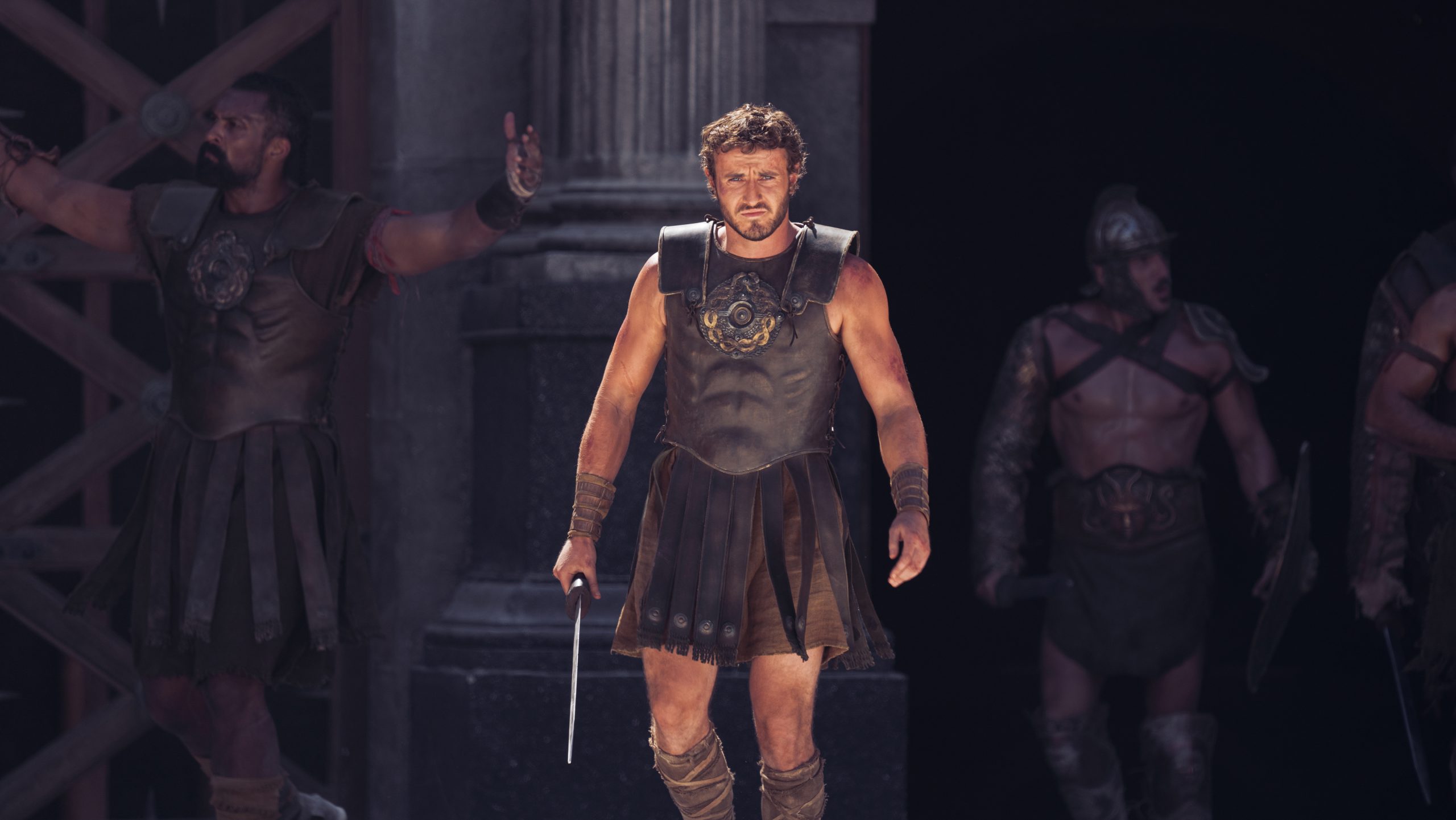At the turn of the century, Gladiator (2000) broke into an already densely populated film genre: ancient Rome. Driven to theaters by collective fervor for love, war, blood, and varying levels of historical accuracy, audiences flocked to make the film the second-highest grossing film of 2000. Grossing over $460 million worldwide, it quickly cemented itself in a long line of Roman predecessors including Ben Hur (1959) and Spartacus (1960).
More than 20 years later, few—if any—movies have bested Gladiator for its exhaustive attention to detail. Careful cinematography, astute acting, and a sweeping score breathed life into the gore and the glory of Rome. For some, the film remains unparalleled in its genre; news of the long awaited sequel stirred up action-lovers and Joaquin Phoenix or Russell Crowe fans alike. The excitement generated around the film challenges that of other highly anticipated movies this year, and while some will love Gladiator II (2024) for the fitting sequel that it is, others might be sorely disappointed at its place in the shadow of the original.
The new movie, directed again by Ridley Scott, takes place over a decade after the events of the original, following Lucius (Paul Mescal) and his path to reclaim Rome, oligarchic and overrun with corruption, for the people. A continuation of storylines and characters, it sometimes toes the line between paying homage to the original and ripping off its most dynamic plot points. But in terms of demand for a unique plot, historical epics are pretty forgiving—few watch them for their shock factor.
In the same vein, the characterization in Gladiator II isn’t anything to write home about. As with its predecessor, the characters are melodramatic and larger-than-life. But a new cast saves the typologically predictable characters from feeling stale on the big screen. Mescal and co-star Pedro Pascal, who plays Lucius’s sworn enemy General Acacius, deliver convincing performances, proving themselves as valuable additions to the series beyond the pop culture stamp of approval they bear. It’s no secret that the two are equally dedicated as they are talented; they both trained in preparation for the movie, eager to embody the gladiator in mind and body. They each also meld well with Connie Nielson, who revives her role as Lucilla, sharing distinct but authentic chemistries with the returner.
But while the actors are undeniably skilled, their performances in Gladiator II are merely another line to add to their impressive CVs. Neither wears their role the same way they do in Normal People (2020) or The Last of Us (2023). In moments that are particularly heated or tender, Lucius and Acacius are visible in the faces of the two actors. But in moments less emotionally charged, their performances fall a bit flat. When Lucius and Acacius finally face off in the Colosseum, it simply feels like watching Mescal and Pascal sparring, as leather clad and blood stained they may be—not that I’m complaining.
What is exceptional, however, is Denzel Washington’s embodiment of the powerful and manipulative Macrinus. Though the film initially gained traction for starring internet heartthrobs Mescal and Pascal, Washington irrefutably steals the show. Every choice he makes as a ruthless politician and megalomaniac adds layer after layer to what could have been written off as an undynamic supporting role. From the first moment Macrinus acts as a mentor to Lucius, he speaks with brash amusement at the prospect of his mentee’s death. He plays politics deftly and without remorse, stealing and plotting and killing. There’s never a doubt that Macrinus is at best morally grey, and that’s what makes Washington’s performance so compelling. He isn’t presented as the clear antagonist, yet he is so very clearly behind the chaos that is brought about. Somehow evoking respect and disdain all at once, there’s a twisted satisfaction in seeing Macrinus’s conspiracies come together. Named the best actor of the 21st century by the New York Times in 2020, Washington fills every pixel of the screen, demanding attention and control of the narrative both as Macrinus and as himself.
Almost as captivating as Washington is the score, a highlight of the 148 minutes that the film spans. Composer Harry Gregson-Williams is no stranger to epic film scores; he’s worked on dozens of video games, TV shows, and movies, including The Chronicles of Narnia: The Lion, the Witch, and the Wardrobe (2005), and has worked closely alongside Hans Zimmer, who wrote the music to the original 2000 film. Zimmer decided not to return to the sequel, saying in an interview with Curzon in 2024, “I’ve done that world. And I think I did it well.” In the same breath, he also said that the “film is in really good hands. Trust me.” And in Zimmer we trust.
They don’t make music like this anymore. Modern films seem to lean toward ambient, delicate scores, taking subtler approaches to their musical accompaniment. Or, a carefully curated soundtrack of popular music that viewers know and love. While these musical styles have their place, Zimmer and now Gregson-Williams’s return to John Williams-esque, neoromantic scores fuel the heart of Gladiator II. Moments of intense suspense are driven home with heavy percussion and powerful horns, while triumph is marked by soaring melodies and pulsing string instruments. The score is grandiose and exaggerated at times—but in a good way. It compliments the vehemence of the film itself.
The movie’s thrilling score also feels reminiscent of classic soundtracks, like that of The Good, the Bad and the Ugly (1966) and Back to the Future (1985). With its grand orchestral music, Gladiator II already feels nostalgic, as if it were a long time favorite. Gregson-Williams admirably maintains the style and mood of Zimmer’s compositions while expanding with his own contributions, giving the soundtrack a role of its own.
Like the music, the cinematography of Gladiator II similarly stays true to the original, bringing back cinematographer John Mathieson, but improving on graphic quality. Some parts are commendable, like the rich colors that epitomize the world of the powerful. A variety of bright hues, shimmery metals and flashy textures point to the gluttony of emperors and senators, especially in contrast to the brown leather that adorns Mescal for most of the film. Keeping the contrast high, blood seems darker and dust seems chalkier. It’s a technique that makes the absurdity of corruption and bloodshed seem that much more tangible.
At the same time, the movie’s use of CGI is underwhelming. Boat scenes are notoriously hard to film, yet there’s a decent length of the movie’s run time dedicated to a sea battle that’s thoroughly unconvincing. Additionally, some of the CGI used for Mescal’s battle with animals almost comes across as tacky with how inauthentic it looks. Still, the tawdry use of CGI is in part a testament to how artfully the rest of the film is captured; for a two-and-a-half-hour movie, there are really only a few moments that stand out like this. But then again, it seems hardly worth it to spend time and money on a couple of moments that could just be cut out. If bloodthirsty monkeys v. Mescal was a scene that really couldn’t be conceded, perhaps a bit more strategizing could have been helpful—behind the scenes images of Mescal faux fighting some motion censored puppets were all too easy to picture.
On its own, Gladiator II is a respectable film, worth the movie ticket but perhaps not a rewatch. But after a two decade wait, it’s impossible to separate it from its predecessor. If Gladiator stands as a quintessential Roman retelling, Gladiator II is paradigmatically its sequel. It has the arena fights, the gladiator garb, the exotic animals, and power-hungry villains. It continues the story of the first movie in some ways that are powerful and some ways that are awkward. It inherits the best parts of the original and in some cases, makes them ever so slightly worse. It’s not bad, but it isn’t amazing.
Any viewers expecting a film rivaling the beauty of the first Gladiator might find this new film a moribund impression of Scott’s 2000 classic. But Gladiator purists would surely be let down by anything other than the original. For those hardcore fans: it’s okay to hate the sequel. But for the more casual viewer—for fans of Mescal, Pascal, or Washington; for fans of Roman retellings; for action movie buffs; or just for those of us with slightly more realistic expectations—Gladiator II is a solid movie. It’s a sequel—an echo of the original, for better and for worse.







